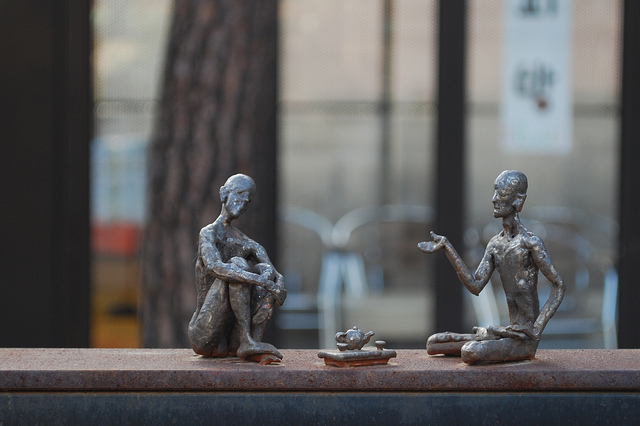Julianne Schultz and Brendan Gleeson (eds), 2016. Griffith Review 52: Imagining the Future, Text Publishing, Melbourne. Available online: https://griffithreview.com/editions/imagining-the-future/
Every day, we shape our tomorrows by discussing the future. To shape a better tomorrow, we need to have purposeful and constructive discussions about the future.
Yet, our discussions of the future are often vague, uncreative and fail to demonstrate hope. Too often, visions of the future are created by elites and seek to achieve goals irrelevant to the everyday reality of the people. We rarely work together to imagine a radically different future, preferring to perpetuate current norms, values and world views. Sadly, when we bring up tomorrow, it is often terrifying, demoralising and worrying.
How can we improve our discussions of the future?
I draw inspiration from the 52nd edition of Griffith Review, Imagining the Future. Each piece in this volume, published in 2016, discusses the future based on insightful observations of the past and present. Imagining the Future demonstrates three key characteristics of how we could be discussing the future more purposefully and effectively. The works in Imagining the Future are creative, ambitious, people-focussed and inclusive. This volume provides a stark and direct contrast to discussions you might see in the media, amongst your colleagues or in other academic publications relating to the future.
The title Imagining the Future immediately reminds us to think about the future creatively. In the volume, poems, short stories and artworks are scattered amongst expert commentary, long-form essays and personal reflections to demonstrate how creative mediums can add to discourses about the future. For example, the fictional piece The Great Unmapping Project of 2016 by Tony Birch discusses the relationship between Indigenous pasts and Indigenous futures, presenting a heartfelt vision of an accepted and strong urban Indigenous population that remains connected to their country and culture, its past and its future. Richard King, in his article Future Perfect, provides an unflinching record of attempts to imagine the future in creative fictional texts, which are, notably, mostly dystopian. The rest of the volume challenges the need to view the future with pessimism and provides a hopeful view of the future. This demonstrates that creativity is needed to imagine a future that is not only better, but different. Without creativity, our visions of the future will remain steeped in economic rationalist rhetoric and other myths that perpetuate unjust and undesirable present circumstances, such as profound inequality between rich and poor.
Activists and activism play a key role in imagining and promoting visionary and critical visions of the future. It was surprising how many of the articles in Imagining the Future discuss the power and importance of activism. Each article discusses activism in a different way, so it is unlikely that the editors engineered the connection. For example, New Power, New Realities by Kathy Marks champions the prospect of the democratisation of power generation when communities take control of generating power for themselves. This supports meaningful, rapid action, taken by united communities against climate change, polluting industries and multi-national companies. On the other hand, Antony Funnel presents more conventional views of the nature of activism. Funnel argues for a reclamation of agency in a hyper-consumerist present. In line with my critiques that current discussions of the future are too enmeshed with existing systems, Jane Gleeson-White argues for “A new mother tongue” that does away with the language of economic capital, to be replaced with the language of human capital, intellectual capital, social capital and natural capital. In doing this, she calls for greater consideration of the power of people to enact change. These authors, and others in the volume, uncompromisingly call every reader to arms to defend, fight for and achieve a future we want to live in.
In line with the idea that everyone ought to be involved with imagining the future, this peer-reviewed, academic, literary journal includes submissions from non-expert authors. For example, Siobhan Harvey contributes a well-argued, hopeful and substantial contribution to the state housing debate, presenting a vision for a just future of adequate housing for all. Harvey is an author and creative writing lecturer; her writing for this journal is based on her lived experience. Her voice is given equal weight in the journal amongst authors such as Nobel Laureate Al Gore and public intellectual Tim Flannery. When we discuss the future, we should privilege everyday voices and different forms of knowledge. This need is increasingly being recognised in academia. Several disciplines have recently taken critical turns towards the equal valuation of Indigenous knowledge, local knowledge, non-scientific, non-Western and non-heteronormative views in research. Valuing diverse sources of knowledge will give discourses of the future a richness, a human face and a long-term outlook and ensure that our discussion consider the needs of all those who will be present in the future, not only elites and academics. We ought to democratise the discourses of the future.
I hope that this volume of Griffith Review provides a glimpse of the discourses of the future. Imagine if a politician on breakfast radio presented a creative argument tomorrow, that drew on the lived experience of his constituents and that invited and welcomed participatory action. Imagine if, when we met our friends for coffee, we could calmly envisage a world where community ownership made essential services more affordable and where local knowledge was used to make decisions about resource management. Imagine if we could be certain that displays of activism would prompt major global action to prevent the most devastating effects of climate change, the plight of refugees or the progression of marriage equality rights. If we could be creative, inclusive and value different forms of knowledge, maybe bringing up tomorrow wouldn’t be so scary.

